In my country there is a crisis with water in spite of having a great lack of the precious liquid / En mi país hay crisis con el agua a pesar de tener una gran reserva del preciado liquido [Spanish / English] .
In my country Venezuela (South America), the largest water basin is the Orinoco River, whose surface is close to one million km², and has a presence in 65% of the territory. The size of this basin makes it the third largest in South America, and the third largest river in the world.
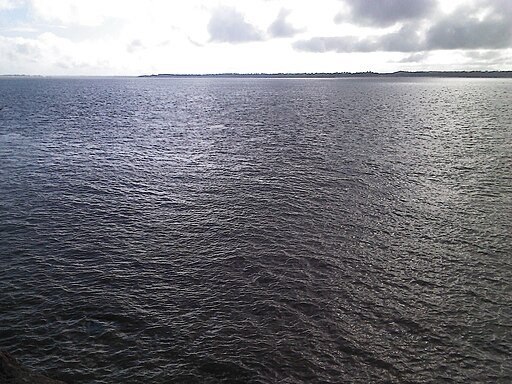
Ali josé, CC BY-SA 3.0 https://creativecommons.org/licenses/by-sa/3.0, via Wikimedia Commons
At least a hundred large rivers flow in the country, whose basins cover more than 1,000 km², among which the Caroní, Caura, Apure, Meta, Ventuari, Portuguesa, Santo Domingo, Uribante and Chama among others can be highlighted.
However, access to clean and safe water, an issue of utmost importance for the health and well-being of the population, has faced various challenges in terms of the quality of drinking water. It can be stated that in Venezuela there is a water crisis, due to a severe problem of access to water and its quality.
In addition, there is a serious impact on hydrographic basins that has negative impacts on water cycles and, together with the process of degradation of water sources and the collapse of the institutions in charge of managing the liquid, they have suffered profound impacts.
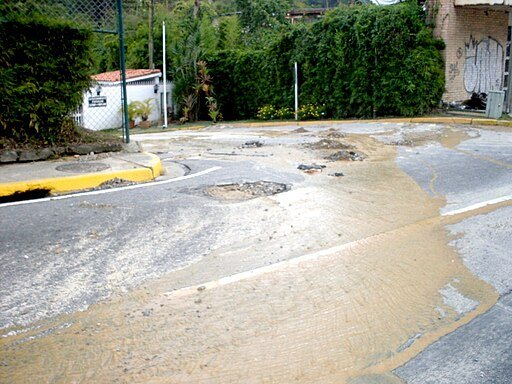
EL Guarito, CC BY-SA 3.0 https://creativecommons.org/licenses/by-sa/3.0, via Wikimedia Commons
The main sources of water in Venezuela are at risk due to the exploitation of gold and other minerals, as well as constant oil spills. Most reservoirs intended for the production of drinking water are filled with nutrients, such as agricultural or forestry waste, which favors the accelerated growth of algae and other green plants that cover the water surface.
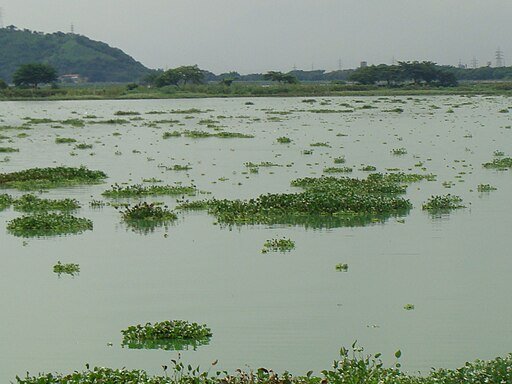
Source
Given the lack of investment in infrastructure and the effects of the drought we are experiencing, the restrictions on drinking water service have increased due to the longer periods of rationing, which affects 69% of the population. Venezuelans often carry water on foot, and those of us who do not have water tanks store it in jerry cans or small containers.the water service in my country is very bad, there is a lack or intermittent supply and when it arrives there is the presence of residues in the liquid.
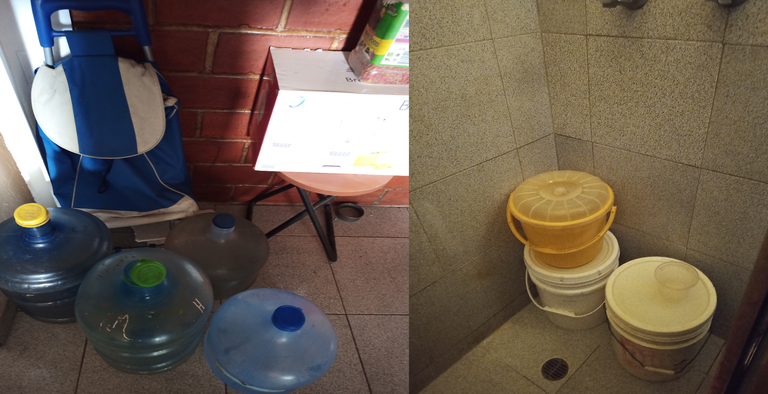
Over the years, the country has experienced a series of difficulties in terms of infrastructure and management of water resources. The lack of investment in water treatment and distribution systems has led to the contamination of natural sources and the spread of waterborne diseases. On the other hand, the economic and political crisis the country is going through has impacted the government's ability to guarantee access to safe drinking water for the entire population.
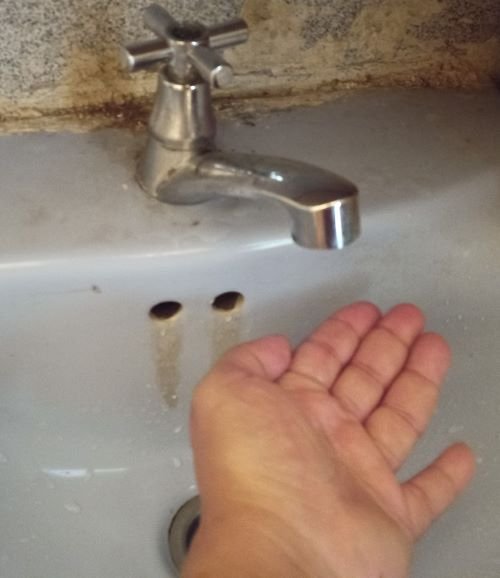
Lack of investment in water infrastructure and corruption in the public sector hinder efforts to improve water quality and ensure equitable access for all citizens. In addition, climate change and deforestation aggravate water scarcity in some regions of the country, requiring the implementation of adaptation and mitigation measures to address this challenge.
Experts in the area of public health and the environment have conducted research and proposed initiatives to improve water quality and raise public awareness of the importance of safe water consumption. Likewise, non-governmental organizations and volunteers have worked on the implementation of water purification and distribution projects in vulnerable communities, thus contributing to mitigate the effects of water scarcity and contamination.
In terms of measures taken to ensure a clean and safe water supply, it is essential to intensify surveillance and monitoring of water quality throughout the country. It is necessary to have efficient treatment systems that eliminate contaminants present in natural sources and ensure that the water reaching households is fit for human consumption. In addition, it is essential to promote water conservation practices and raise public awareness of the importance of preserving this valuable natural resource.
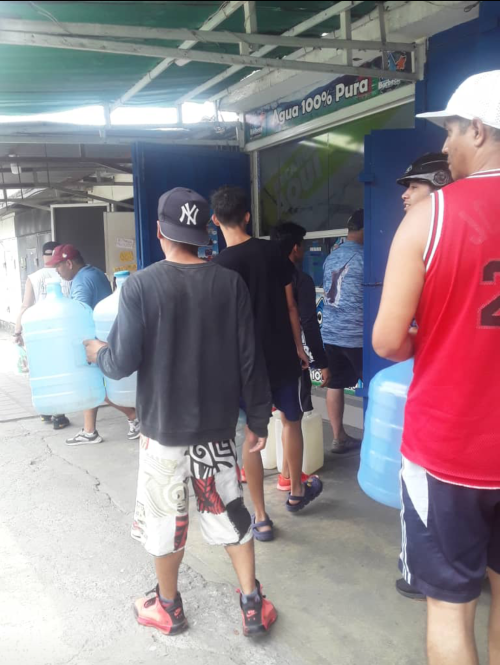
In the city where I live, (Guarenas), the lack of drinking water service is something intolerable there are localities that have come to be up to 25 days, in particular every three days I must buy bottles of drinking water in fillers that ensure that the liquid is 100% potable, this water is generally used for drinking and cooking. When the water arrives through pipes, I store it in plastic containers and use it for bathing, washing toilets, washing floors and washing some everyday clothes.
I have to say that on several occasions I boil the water that comes through the pipes to kill disease-causing microbes, including viruses, bacteria and parasites, but I still observe the sedimentation of soil in the water.
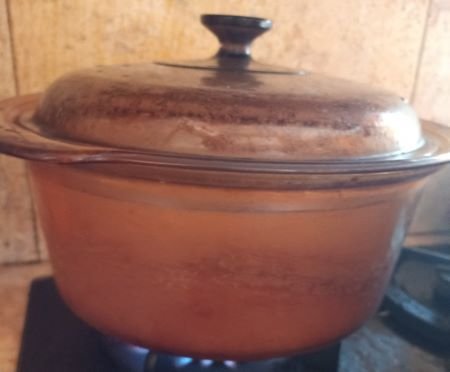
The water situation in Venezuela is an issue of great relevance that requires the attention and action of all sectors of society. It is essential to work collaboratively to ensure a clean and safe water supply for all citizens, implementing efficient treatment and distribution measures, promoting sustainable conservation and awareness practices, and strengthening water governance. Only through a joint and committed effort will we be able to ensure that Venezuela has clean and healthy drinking water for all.
This is my first participation in the week developing this topic:
What Are You Drinking?: How clean is your water? We all know just how important clean water is for our daily lives, so what steps do we take to make sure we consume only the cleanest that we can afford? What tips can you offer us to make our water healthier, cleaner and more affordable for everyone? Please share with us.
A big greeting to all, I hope that currently you can enjoy the water service and have the possibility of making it drinkable or buying it, I do not have the precious liquid today!
The images without attribution are my property and were taken with my Umidigi F2 cell phone.
The separator is free to use and has been provided by @onexel. Link here

En mi país Venezuela (América del Sur), la mayor cuenca de agua es la del Rio Orinoco, cuya superficie es cercana al millón de km², y tiene una presencia en el 65% del territorio. El tamaño de dicha cuenca la hace la tercera de América del Sur, y el tercer río más caudaloso del mundo.

Ali jose, CC BY-SA 3.0 https://creativecommons.org/licenses/by-sa/3.0, via Wikimedia Commons
En el país fluyen al menos un centenar de grandes ríos, cuyas cuencas abarcan más de 1.000 km², dentro de los cuales se pueden destacar el Caroní, Caura, Apure, Meta, Ventuari, Portuguesa, Santo Domingo, Uribante y Chama entre otros.
Sin embargo, el acceso a agua limpia y segura, un tema de suma importancia para la salud y bienestar de la población, ha enfrentado diversos desafíos en cuanto a la calidad del agua potable. Se puede afirmar que en Venezuela hay una crisis hídrica, debido a un severo problema de acceso al agua y la calidad de la misma.
Ademas, hay una seria afectación de las cuencas hidrográficas que tiene impactos negativos en los ciclos del agua y, en conjunto con el proceso de degradación de las fuentes de agua y el colapso de las instituciones encargadas de gestionar el líquido han sufrido impactos profundos.

EL Guarito, CC BY-SA 3.0 https://creativecommons.org/licenses/by-sa/3.0, via Wikimedia Commons
Las principales fuentes de agua en Venezuela ese encuentran en riesgo por las actividades de explotación de oro y otros minerales, así como por los constantes derrames petroleros. La mayoría de los embalses destinados a la producción de agua potable se encuentran con nutrientes, como desechos agrícolas o forestales, lo que favorece el crecimiento acelerado de algas y otras plantas verdes que cubren la superficie del agua.

Fuente
De la misma manera, estas fuentes se encuentran llenas de arena y sedimentos lo que hace que el agua se vuelve turbia y con poco oxígeno, lo que afecta a los seres vivos.
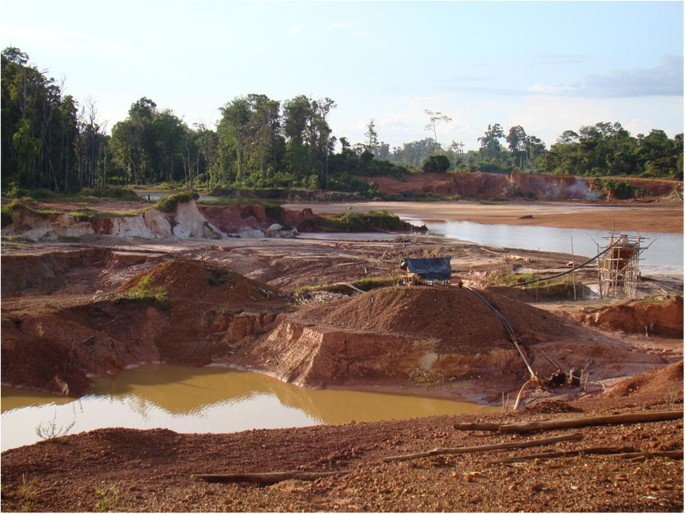
Sumemos a todo esto que el agua captada no es sometida a procesos de potabilización adecuados.
Dada la falta de inversión en infraestructura y los efectos de la sequia que estamos viviendo las restricciones en el servicio de agua potable aumentaron debido a que se incrementaron los lapsos de los racionamientos, lo que afecta a 69% de la población. El venezolano transporta muchas veces el agua a pie, y los que no disponemos de tanques de agua la almacenamos en bidones o envases de pequeño tamaño.El servicio de agua en mi país es muy malo , hay falta o intermitencia de suministro y cuando llega hay presencia de residuos en el líquido.

A lo largo de los años, el país ha experimentado una serie de dificultades en cuanto a la infraestructura y gestión de los recursos hídricos. La falta de inversión en sistemas de tratamiento y distribución del agua ha llevado a la contaminación de fuentes naturales y a la propagación de enfermedades transmitidas por el agua. Por otro lado, la crisis económica y política que atraviesa el país ha impactado en la capacidad del gobierno para garantizar el acceso a agua potable para toda la población.

La falta de inversión en infraestructura hídrica y la corrupción en el sector público obstaculizan los esfuerzos por mejorar la calidad del agua y garantizar su acceso equitativo para todos los ciudadanos. Adicionalmente, el cambio climático y la deforestación agravan la escasez de agua en algunas regiones del país, lo cual requiere implementar medidas de adaptación y mitigación para enfrentar este desafío.
Expertos en el área de la salud pública y el medio ambiente han realizado investigaciones y propuesto iniciativas para mejorar la calidad del agua y concientizar a la población sobre la importancia de su consumo seguro. Asimismo, organizaciones no gubernamentales y voluntarios han trabajado en la implementación de proyectos de purificación y distribución de agua en comunidades vulnerables, contribuyendo así a mitigar los efectos de la escasez y la contaminación del recurso hídrico.
En cuanto a las medidas tomadas para asegurar un suministro de agua limpio y seguro, es fundamental intensificar la vigilancia y el monitoreo de la calidad del agua en todo el país. Es necesario contar con sistemas de tratamiento eficientes que eliminen los contaminantes presentes en las fuentes naturales y garanticen que el agua que llega a los hogares sea apta para el consumo humano. Además, es fundamental promover prácticas de conservación del agua y concientizar a la población sobre la importancia de preservar este recurso natural tan valioso.

En la ciudad donde vivo, (Guarenas), la falta de servicio de agua potable es algo intolerable hay localidades que han llegado a estar hasta 25 días , en lo particular cada tres dias debo comprar botelloners de agua potable en llenaderos que aseguran que el liquido es 100% potable, esta agua la utilizo generalmente para tomar y cocinar. Cuando llega el agua por tuberias, la almaceno en evases plasticos y la uso para bañarme, lavar baños, lavar pisos y lavar algunas prendas de uso diario.
He de decir que en varias oportunidades hiervo el agua que llega a traves de la tuberia para matar los microbios causantes de enfermedades, incluidos los virus, las bacterias y los parásitos, pero de igual forma se observa la sedimentación de tierra en la misma.

La situación del agua en Venezuela es un tema de gran relevancia que requiere la atención y acción de todos los sectores de la sociedad. Es fundamental trabajar de manera colaborativa para garantizar un suministro de agua limpio y seguro para todos los ciudadanos, implementando medidas de tratamiento y distribución eficientes, promoviendo prácticas sostenibles de conservación y concientización, y fortaleciendo la gobernanza del recurso hídrico. Solo a través de un esfuerzo conjunto y comprometido se podrá asegurar que en Venezuela se pueda beber agua limpia y saludable para todos.
Esta es mi primera participación en la semana desarrollando el presente tema:
¿Qué está bebiendo? ¿Cómo de limpia es tu agua? Todos sabemos lo importante que es el agua limpia para nuestra vida diaria, así que ¿qué medidas tomamos para asegurarnos de que consumimos sólo la más limpia que podemos permitirnos? ¿Qué consejos puedes ofrecernos para que nuestra agua sea más sana, limpia y asequible para todos? Compártelo con nosotros.
Un gran saludo a todos, espero que en la actualidad puedan gozar del servicio de agua y tengan la posibilidad de potabilizarla o de comprarla, yo no tengo el preciado liquido el día de hoy!.
Las imágenes que no presentan atribución son de mi propiedad y fueron tomadas con mi teléfono celular Umidigi F2.
El separador es de uso gratuito y ha sido proporcionado por @onexel. Enlace aquí

That is so crazyyy... What exactly is the government doing about this?
The government claims that we do not have water because of the drought caused by climate change, but if we pay attention we see reservoirs and water systems in very bad condition for more than 20 years. The resources to maintain aqueducts and water systems are diverted for purely political purposes and the population suffers the consequences. Personally I have spent more than 20 days without water, buying bottles of mineral water, trying to dirty my clothes as little as possible since there is no water to wash with. When the water arrives, entire families are dedicated to collect it in containers, bottles and tanks, it is stored and distributed for washing dishes, household cleaning, washing toilets and washing underwear.
That is so sad to hear. How are the elites doinGV? Do they have the same struggles?
This is quite a bad situation in your country, oh no.. people can easily get infection without adequate and clean water...I am really worried about your country and I wish that this basic amenity will be looked into by your government
You are trying ur best to get clean water for your family
In particular, I spend a small fortune on drinking mineral water that I buy in various stores that proliferate in my city. However, I also boil it, and I really trust it more than water from aqueducts because it does not show any sediment. There are many allergies in the population due to bathing with contaminated water.
This is really a sad one honestly... Reading through your post makes me want to tell the government that all they are doing aren't worth it if they can't give the community a good water supply for their consumption.. like everything we do literally runs through water and so the need for a good clean water cannot be overemphasized at all.
The government should control the functioning of a country, especially when it comes to sanitation or vital supplies such as water. By not knowing how to plan and divert funds, the population gets sick from the consumption of contaminated water, and the lack of hygiene due to the lack of cleanliness. The citizen must demand and monitor the proper use of natural resources, (including monetary ones). The fact is that the rulers do not support the population.
It's either this or the rulers are clueless of what to even do that they fail.to recognise the impact of good health in a country
A healthy country is a wealthy one!!
Both the government and the people really need to act fast, I can't imagine what it feels like. I just wish the government listen to the cry and plea of the people, this is too much.
People complain every day in the press, radio, television and internet. The government is dragging its feet and instead of looking for solutions they blame climate change and sabotage by the opposition, they do not want to recognize how destroyed the country's water system is.
Water is so useful to every human. Is there no provision for drilling Boreholes for individuals? That helps to save lots of stress here because several families do have their own source of water and those who don't have do buy. Though a times there's scarcity
There are municipalities that have carried out this practice, but under the system of citizen self-management under the supervision of the mayor's office, but this is not the case everywhere, as economic resources are often lacking.
This requires urgent attention and I hope appropriate authorities takes immediate and urgent intervention.
There are many complaints and that is why I am commenting that we are in a crisis regarding the water issue, the government is more concerned about the next elections than the maintenance of reservoirs and drinking water supplies.
Hmmmn
I now get what you are saying which is true. Thanks for shedding more light on it and for commenting, I really appreciates.
This post has been manually curated by @steemflow from Indiaunited community. Join us on our Discord Server.
Do you know that you can earn a passive income by delegating to @indiaunited. We share more than 100 % of the curation rewards with the delegators in the form of IUC tokens. HP delegators and IUC token holders also get upto 20% additional vote weight.
Here are some handy links for delegations: 100HP, 250HP, 500HP, 1000HP.
100% of the rewards from this comment goes to the curator for their manual curation efforts. Please encourage the curator @steemflow by upvoting this comment and support the community by voting the posts made by @indiaunited.
Sometimes I wish my area would struggle through the same problems that you have just for a little while. We have good water and good treatment facilities but people are so used to clean water that we seem to waste it at every opportunity. In truth water is so valuable it should never be wasted, even if it is plentiful!
As for your situation I've heard a rumor (unsubstantiated) that water was more expensive in Venezuela than Gasoline at one point. But people can live without gasoline but they certainly can't without water. As for sediment and other contaminants... that's rough. I do hope that your government finds a way to ensure reliable water...then again, I rarely trust governments to get things done right.
Best wishes for the future and thanks for writing.